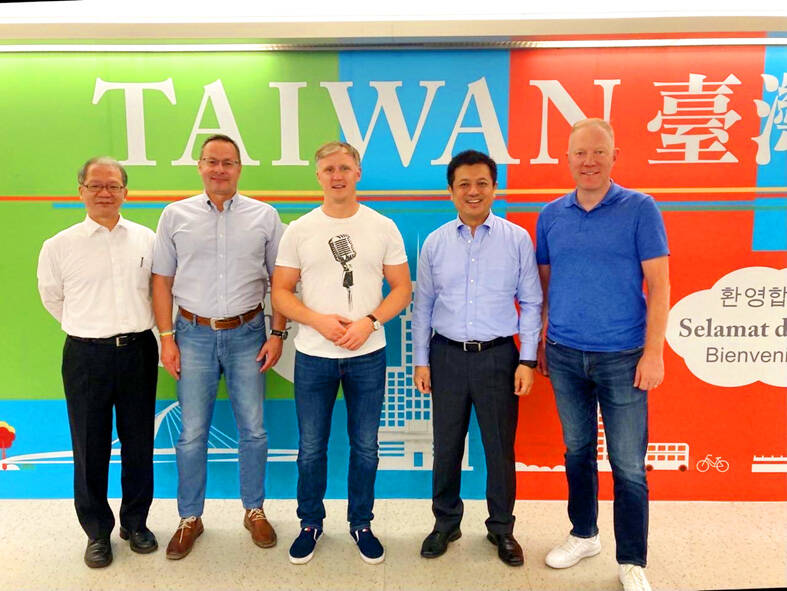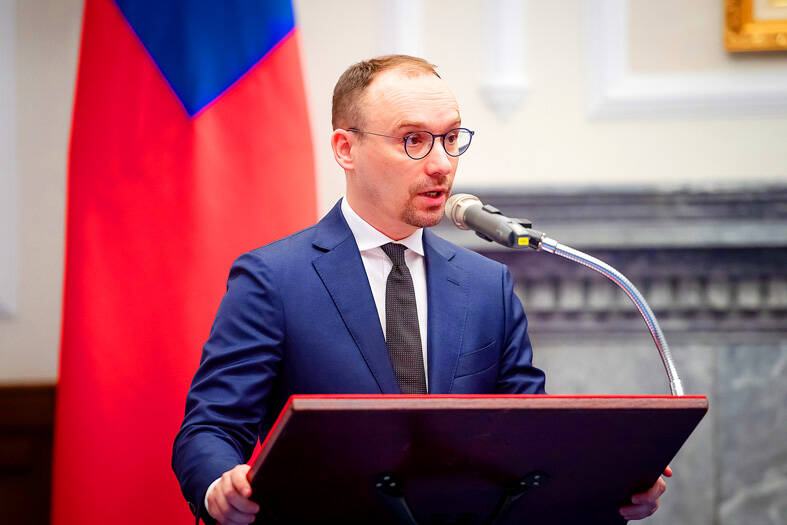The “status quo” of the Taiwan Strait cannot be changed unilaterally, and “any eventual resolution must be found via diplomacy and dialogue,” a delegation comprising the heads of the Estonian, Lithuanian and Latvian parliaments’ foreign affairs committees said yesterday
Marko Mihkelson, chairman of the Foreign Affairs Committee of the Estonian Parliament, Zygimantas Pavilionis, chairman of the Foreign Affairs Committee of the Lithuanian Seimas, and Rihards Kols, chairman of the Foreign Affairs Committee of the Latvian Saeima, arrived in Taiwan yesterday on a six-day visit, the Ministry of Foreign Affairs said.
Pavilionis called them the “Three Baltic Musketeers” in a tweet on X, announcing the start of their visit to the “beacon of freedom, democracy, human rights & rules-based order.”

Photo courtesy of the Ministry of Foreign Affairs
Kols described the trip as a “fact-finding mission/visit” that would focus on security and defense, business, cultural ties and economic partnerships.
“The visit shows a shared policy in relations with Taiwan in accordance with EU policy,” the Estonian Parliament’s Foreign Affairs Committee said in a news release on Saturday.
The three “underline that the status quo in the Taiwan Strait cannot be changed unilaterally, and they oppose the use or threat of force. Any eventual resolution must be found via diplomacy and dialogue,” it said.

Photo: EPA-EFE / Taiwan Presidential Office
In other developments, Lithuanian lawmaker Matas Maldeikis told the Voice of America that Taiwan would ultimately benefit from Lithuania’s success in resisting Chinese economic coercion and political bullying.
“Lithuania was well aware that it would pay a huge price for supporting Taiwan, including commercial losses, but it will not compromise with the [Chinese] Communist Party,” Maldeikis was quoted as saying in a report published in Chinese on Saturday.
“In the long run, the biggest winner from what is happening here [in Europe] is Taiwan,” he said.
In 2021, Taiwan opened the Taiwanese Representative Office in Lithuania in the capital, Vilnius, using the name “Taiwanese” with the permission of Lithuania, instead of “Taipei,” which most countries use for fear of provoking Beijing.
China then imposed economic sanctions on Lithuania, downgraded diplomatic ties between them and withdrew its ambassador from Vilnius, while demanding the European country do the same.
Beijing envisioned a quick win, believing that the Lithuanian government would cave in or make concessions, Maldeikis told the Voice of America.
“The result was unexpected,” he added.
NATO held a summit in Vilnius last month and Lithuania’s exports grew 45 percent in a year and a half after China imposed the sanctions, Maldeikis said.
Lithuania showed other nations that by disobeying China a country can still win, he said.
“We will not sell ourselves out for the Chinese market, nor will we deceive ourselves and others by saying that nothing happened to sell products to the Chinese market,” he said.
Lithuanians standing up to Beijing “forces the EU to stop hiding behind diplomatic, but sometimes meaningless rhetoric when it comes to the situation in the Taiwan Strait,” Una Aleksandra Berzina-Cerenkova, director of Riga Stradins University’s China Studies Centre, said in the Voice of America piece.
The “wolf-warrior diplomacy” practiced by China over the past few years has fueled resentment among Lithuanians, Maldeikis said.
Under the leadership of the US, a new wave of support for Taiwan has emerged in the international community, he said.
In Lithuania, taking a supportive stance toward Taiwan and a firm stance against China helps win votes for politicians, he said.
However, relations between Taiwan and Lithuania sparked controversy last month when Chinese Nationalist Party (KMT) Legislator Wang Hong-wei (王鴻薇) said that Taiwan provided funds and technology to produce 8-inch silicon wafers in Lithuania to cultivate ties.
Representative to Lithuania Eric Huang (黃鈞耀) told the Voice of America that it was a mutually beneficial program with funding provided by both sides.

A Chinese freighter that allegedly snapped an undersea cable linking Taiwan proper to Penghu County is suspected of being owned by a Chinese state-run company and had docked at the ports of Kaohsiung and Keelung for three months using different names. On Tuesday last week, the Togo-flagged freighter Hong Tai 58 (宏泰58號) and its Chinese crew were detained after the Taipei-Penghu No. 3 submarine cable was severed. When the Coast Guard Administration (CGA) first attempted to detain the ship on grounds of possible sabotage, its crew said the ship’s name was Hong Tai 168, although the Automatic Identification System (AIS)

An Akizuki-class destroyer last month made the first-ever solo transit of a Japan Maritime Self-Defense Force ship through the Taiwan Strait, Japanese government officials with knowledge of the matter said yesterday. The JS Akizuki carried out a north-to-south transit through the Taiwan Strait on Feb. 5 as it sailed to the South China Sea to participate in a joint exercise with US, Australian and Philippine forces that day. The Japanese destroyer JS Sazanami in September last year made the Japan Maritime Self-Defense Force’s first-ever transit through the Taiwan Strait, but it was joined by vessels from New Zealand and Australia,

SECURITY: The purpose for giving Hong Kong and Macau residents more lenient paths to permanent residency no longer applies due to China’s policies, a source said The government is considering removing an optional path to citizenship for residents from Hong Kong and Macau, and lengthening the terms for permanent residence eligibility, a source said yesterday. In a bid to prevent the Chinese Communist Party (CCP) from infiltrating Taiwan through immigration from Hong Kong and Macau, the government could amend immigration laws for residents of the territories who currently receive preferential treatment, an official familiar with the matter speaking on condition of anonymity said. The move was part of “national security-related legislative reform,” they added. Under the amendments, arrivals from the Chinese territories would have to reside in Taiwan for

CRITICAL MOVE: TSMC’s plan to invest another US$100 billion in US chipmaking would boost Taiwan’s competitive edge in the global market, the premier said The government would ensure that the most advanced chipmaking technology stays in Taiwan while assisting Taiwan Semiconductor Manufacturing Co (TSMC, 台積電) in investing overseas, the Presidential Office said yesterday. The statement follows a joint announcement by the world’s largest contract chipmaker and US President Donald Trump on Monday that TSMC would invest an additional US$100 billion over the next four years to expand its semiconductor manufacturing operations in the US, which would include construction of three new chip fabrication plants, two advanced packaging facilities, and a research and development center. The government knew about the deal in advance and would assist, Presidential